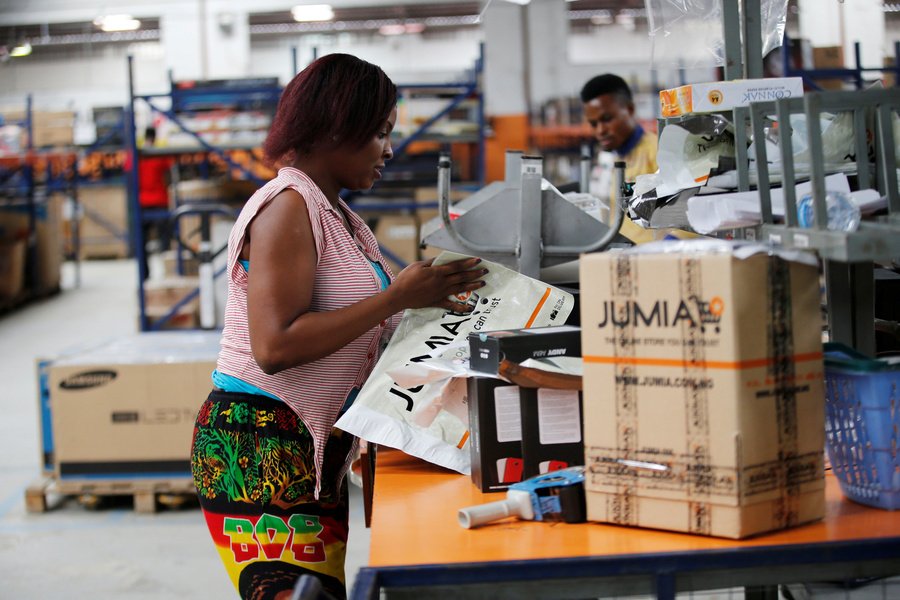In Africa, the COVID-19 pandemic has, to a great extent, brought to the fore the potential of the digital economy. One sector where this is most vivid is e-commerce. Stay-at-home orders boosted online shopping activity during lockdowns and companies, large and small, are now leveraging online channels to drive business growth amid the crisis.
But much of the gains in e-commerce has so far been realised by male-owned businesses, which saw a collective 7% rise in sales during the pandemic. By contrast, female-owned businesses saw a 7% decline, per Women and E-commerce in Africa, a report by the International Finance Corporation (IFC) that examines the state of e-commerce across Kenya, Nigeria, and Ivory Coast.
More often than not, technological advances exacerbate existing gender inequalities. In this instance, women lag behind their male counterparts in terms of accessing and using digital marketplaces, despite representing half of Africa’s population and accounting for the bulk of entrepreneurial activity in many African countries.
“There is a digital disconnect,” says Mercy Wanjau, Director, Legal and Board Advisory, at the Communications Authority of Kenya (KCA) while delivering her keynote speech during the first TechCabal Live session this year. “It’s provocative and sad. So much progress has been made in connectivity globally, even in Africa, but there’s still a disconnect when you look at the situation from a gender lens.”
Wanjau adds that the internet is a “gateway to huge economic opportunities” and with women having no access, there’s a digital disconnect and denial of opportunities, particularly in the low and middle-income countries.
Over the past decade, e-commerce in Africa has expanded rapidly and the market value is expected to quadruple in the next decade. But with equal participation rates from both men and women in e-commerce, the growth could be even higher, per the report.
Beyond participation, however, there exists an earning gap between e-commerce businesses owned by women compared to those owned by men, skewed in favour of the latter. According to the IFC report—compiled with data from Jumia, Africa’s largest e-commerce platform—closing this gap between male and female vendors by 2025 would yield $14.5 billion in additional e-commerce market value in Africa by 2030.
How can this be achieved?
Juliet Anammah, Jumia Nigeria’s Chairwoman and Chief Sustainability Officer for the Group, notes that increasing the number of women selling through e-commerce platforms is crucial.
In countries like Nigeria, many women own physical stores while a growing number of female merchants sell through informal social commerce platforms like WhatsApp and Instagram. Helping the latter group transition to selling via formal e-commerce platforms, where they can access wider markets and business records needed to secure loans, is one of Jumia’s objectives, in line with closing the gender gap in e-commerce.
“It’s clear one of the ways women can grow their businesses through e-commerce is participating on platforms,” Anammah says. “Many traders opt for social commerce but in such instances, you’re a single player and not aggregating data that can be useful when applying for loans. On Jumia, there’s a database on your sales history, transactions, which lending partners use in providing credit.”
As an entrepreneur and mother of 3, managing her business while taking care of the family was tough for Bukola Ogundijo, until she started selling on Jumia. “The platform has been very helpful in managing my business in 3 major ways,” the founder of Purple Linings Ventures told the TC Live audience. “Warehousing my product, packaging, and delivery whenever I get orders, all of which has reduced my operational costs.”
In terms of access to credit to grow her business, Ogundijo says she’s been able to secure low-interest loans from Jumia’s lending partner, which has helped scale the business faster than her pre-Jumia days.
For Alexa Roscoe, the Disruptive Technology Lead (Gender and Economic Inclusion Group) at the IFC, the value of an enhanced seller base isn’t just about the number of sellers going online but also bringing in more diverse products and services that serve a wider market and more customer needs.
“Entrepreneurs are just half the puzzle of the marketplace,” Roscoe says. “Women are also buying online and we know they are responsible for making the vast majority of consumer decisions such as what groceries to buy.”
Hence, understanding what women consumers want to better serve them is of equal importance, she argues, especially the women new to online shopping. “That way, they see e-commerce as a way to meet their needs. That’s how we can help grow the market and make it more diverse.”
While the report finds that e-commerce companies can lead the way in the bid to increase the number of female entrepreneurs in e-commerce, as well as their sales, the IFC does recognise the importance of partnerships involving investors and policymakers in achieving this goal.
“Partnerships play an important role in bringing together different expertise, expanding knowledge and evidence, and most importantly, scaling impact massively and addressing multiple challenges,” Anne Kabugi, the IFC’s Regional Gender Lead for Africa (Gender and Economic Inclusion Group), says. “There is a huge e-commerce opportunity in Africa but Jumia alone may not be able to do massive research covering different geographies.”
With partnerships that bring in the right resources, expertise, and investments to undertake research, players like Jumia can leverage the data to inform strategy and expansion across the continent.
“More of these partnerships are needed, not just in the private sector but also the public. Government can help remove the legal and regulatory bottlenecks for business expansion and enable women access e-commerce and other digital services through inclusive connectivity policies for instance.”
KCA’s Wanjau holds a similar stance on partnerships between stakeholders. “E-commerce companies or the government can’t do it alone. There’s a need for collaboration across board,” she says. “Cooperation between investors, e-commerce platforms, governments, and development organisations is needed to ensure a multi-stakeholder approach to address these issues. This isn’t restricted to national levels because e-commerce is international.”
Watch the full conversation here:
If you enjoyed reading this article, please share it in your WhatsApp groups and Telegram channels.






















